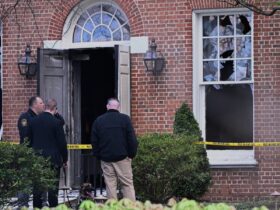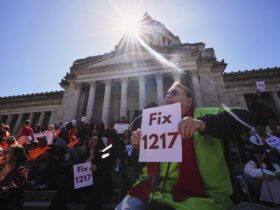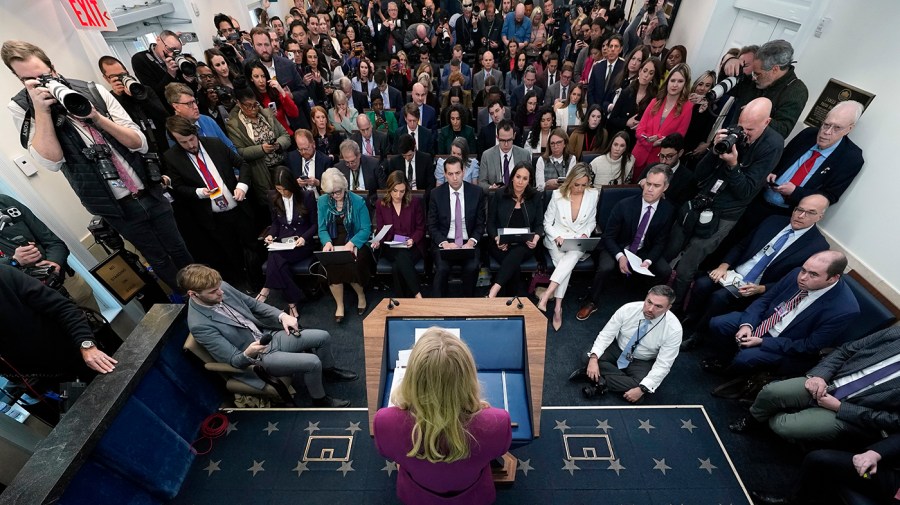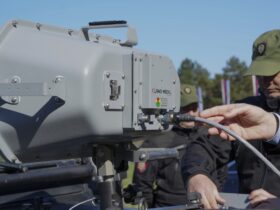The White House’s battle with The Associated Press is far from over.
Though a judge ordered key officials to restore the wire service’s access to certain White House spaces, the Trump administration has found work-arounds to keep the AP iced out in certain places over its refusal to use the term Gulf of America in its popular stylebook.
Two courts in Washington are still weighing in on whether the efforts to shut out the AP are lawful.
U.S. District Judge Trevor McFadden, a President Trump appointee, ruled last week that the White House must let the AP into limited spaces like the Oval Office and Air Force One when they’re made available to other members of the press pool, a small group of journalists who document the president’s activity in and around the White House.
The White House quickly appealed the decision but, days later, instituted a new pool policy eliminating a permanent slot for all wire services.
Wire services, like the AP, are still eligible for selection as part of the pool’s daily print journalist rotation. But the outlet’s lawyers argued that the decision was made for the “express purpose” of diminishing the outlet’s opportunities to cover the president.
At a hearing Friday over the matter, AP lawyer Charles Tobin called it a “spit in the court’s eye.”
McFadden pushed back at that notion, noting that the AP has since been allowed into the press pool.
All AP journalists were excluded Monday through Wednesday, after the judge’s order took effect, but AP’s photographers were allowed back into the photo pool on Thursday and Friday. An AP print journalist is expected to be part of Saturday’s pool — while Trump golfs, Tobin said — for the first time since the White House decided to exclude the outlet.
“One couldn’t say your client is now being kept out,” he said.
But Tobin called the AP’s returned access “gamesmanship” by the White House without including the outlet in what he deemed a meaningful way.
Justice Department lawyer Jane Lyons accused AP of jumping the gun in criticizing the administration’s apparent efforts to comply.
Just days in, it’s “way too soon” to say there is a problem, and to put such little trust in the White House would mark a “sad day,” she said.
“We let this play out,” Lyons suggested.
McFadden agreed that the high-ranking officials were entitled to a presumption of good faith and that the policy, on its face, seems not to discriminate against the AP. However, he signaled that violations of his directive would not be tolerated.
“If there was evidence of noncompliance, that would be a very serious problem, and there would be serious consequences,” he said, warning AP to heed the lesson of “The Boy Who Cried Wolf” in bringing such claims again.
An appeals panel raised similar concerns Thursday about stepping on the White House’s judgment while weighing whether to pause McFadden’s order as the Trump administration’s appeal moves forward.
Judge Gregory Katsas, a Trump appointee, said the White House’s new policy was a “poke in the eye, no doubt about it.” But it still seems to be “viewpoint neutral,” he said, invoking McFadden’s order barring viewpoint discrimination against the AP.
Judge Neomi Rao, another Trump appointee, raised concern that to rule for AP, the court would need to decide that the president does not have absolute discretion in deciding the press pool.
The White House’s new policy says Trump retains “absolute discretion over access to the Oval Office, Air Force One and other comparably sensitive spaces,” though it also says outlets will remain eligible for the pool “irrespective of the substantive viewpoint” they express.
“The court needs to say the president’s discretion is cabined by the Constitution,” Tobin said.
The White House’s fight with the AP comes at a time of heightened tension between the West Wing and mainstream media outlets.
Trump has attacked major broadcast networks he feels are covering his administration’s first 100 days unfairly, threatening to have his Federal Communications Commission scrutinize their broadcast licenses and alluding to legal action against them. Still, he frequently takes questions from those outlets that do serve in the pool.
The West Wing, meanwhile, has sought to fill the press briefing room and pool with an increased number of “new media” members, many of whom lean conservative in their coverage or are supportive of the president’s agenda.
White House press secretary Karoline Leavitt has on multiple occasions teased a shake-up of the press briefing room and has made a habit of frequently calling on members of the “new media” to ask questions first. Traditionally, AP would get the first question at White House press briefings by the press secretary, but the Trump administration has done away with that.
During the appeals argument Thursday, Judge Cornelia Pillard signaled that the White House could avoid unlawfully excluding the AP by eliminating the press pool altogether.
“I think he would be entitled to do that,” said Pillard, an appointee of former President Obama. Though hesitant, AP’s counsel didn’t disagree.
It wouldn’t be the first time the White House took the recommendations of judges to heart.
Earlier in the case, McFadden questioned the White House Correspondents’ Association’s role in deciding who’s allowed in the pool, calling it “a little odd” that White House officials were bound by the organization’s decisionmaking — and suggesting they could “decide to throw out” the group altogether.
The next day, the White House did.
The White House Correspondents’ Association, which has staunchly opposed the administration’s targeting of AP and restructuring of the press pool, said the decision “tears at the independence of a free press.” It objected again when the permanent wire spot was removed from the press pool.
“As we’ve said before, the government should not be able to control the independent media that covers it,” association President Eugene Daniels said following the new policy’s release.
Judges so far seem to believe that the White House is good for its word and will color within the lines of their rulings. Trump vowed in February to adhere to court orders.
“I always abide by the courts and then I’ll have to appeal it,” the president said.
In declining to enforce his order, McFadden called the remark “admirable.”
“I also expect the president’s subordinates to follow the first part of that statement,” he added.
Dominick Mastrangelo contributed.
















Leave a Reply